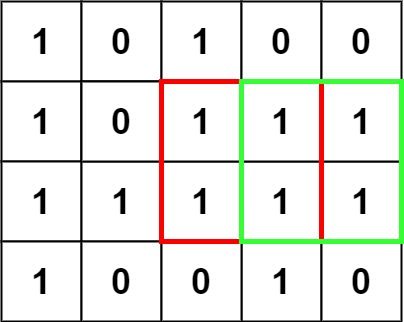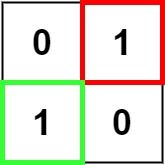Welcome to Subscribe On Youtube
221. Maximal Square
Description
Given an m x n binary matrix filled with 0's and 1's, find the largest square containing only 1's and return its area.
Example 1:

Input: matrix = [["1","0","1","0","0"],["1","0","1","1","1"],["1","1","1","1","1"],["1","0","0","1","0"]] Output: 4
Example 2:

Input: matrix = [["0","1"],["1","0"]] Output: 1
Example 3:
Input: matrix = [["0"]] Output: 0
Constraints:
m == matrix.lengthn == matrix[i].length1 <= m, n <= 300matrix[i][j]is'0'or'1'.
Solutions
Solution 1: Dynamic Programming
We define $dp[i + 1][j + 1]$ as the maximum square side length with the lower right corner at index $(i, j)$. The answer is the maximum value among all $dp[i + 1][j + 1]$.
The state transition equation is:
\[dp[i + 1][j + 1] = \begin{cases} 0 & \text{if } matrix[i][j] = '0' \\ \min(dp[i][j], dp[i][j + 1], dp[i + 1][j]) + 1 & \text{if } matrix[i][j] = '1' \end{cases}\]The time complexity is $O(m\times n)$, and the space complexity is $O(m\times n)$. Where $m$ and $n$ are the number of rows and columns of the matrix, respectively.
-
class Solution { public int maximalSquare(char[][] matrix) { int m = matrix.length, n = matrix[0].length; int[][] dp = new int[m + 1][n + 1]; int mx = 0; for (int i = 0; i < m; ++i) { for (int j = 0; j < n; ++j) { if (matrix[i][j] == '1') { dp[i + 1][j + 1] = Math.min(Math.min(dp[i][j + 1], dp[i + 1][j]), dp[i][j]) + 1; mx = Math.max(mx, dp[i + 1][j + 1]); } } } return mx * mx; } } -
class Solution { public: int maximalSquare(vector<vector<char>>& matrix) { int m = matrix.size(), n = matrix[0].size(); vector<vector<int>> dp(m + 1, vector<int>(n + 1, 0)); int mx = 0; for (int i = 0; i < m; ++i) { for (int j = 0; j < n; ++j) { if (matrix[i][j] == '1') { dp[i + 1][j + 1] = min(min(dp[i][j + 1], dp[i + 1][j]), dp[i][j]) + 1; mx = max(mx, dp[i + 1][j + 1]); } } } return mx * mx; } }; -
''' eg. a 10*10 sqaure with full of 1s this square move 1 line down this square move 1 line right so there needs an extra single 1 at bottom right, to make it a larger full square ''' class Solution: def maximalSquare(self, matrix: List[List[str]]) -> int: m, n = len(matrix), len(matrix[0]) dp = [[0] * (n + 1) for _ in range(m + 1)] mx = 0 for i in range(m): for j in range(n): if matrix[i][j] == '1': dp[i + 1][j + 1] = 1 + min(dp[i][j + 1], dp[i + 1][j], dp[i][j]) mx = max(mx, dp[i + 1][j + 1]) return mx * mx -
func maximalSquare(matrix [][]byte) int { m, n := len(matrix), len(matrix[0]) dp := make([][]int, m+1) for i := 0; i <= m; i++ { dp[i] = make([]int, n+1) } mx := 0 for i := 0; i < m; i++ { for j := 0; j < n; j++ { if matrix[i][j] == '1' { dp[i+1][j+1] = min(min(dp[i][j+1], dp[i+1][j]), dp[i][j]) + 1 mx = max(mx, dp[i+1][j+1]) } } } return mx * mx } -
public class Solution { public int MaximalSquare(char[][] matrix) { int m = matrix.Length, n = matrix[0].Length; var dp = new int[m + 1, n + 1]; int mx = 0; for (int i = 0; i < m; ++i) { for (int j = 0; j < n; ++j) { if (matrix[i][j] == '1') { dp[i + 1, j + 1] = Math.Min(Math.Min(dp[i, j + 1], dp[i + 1, j]), dp[i, j]) + 1; mx = Math.Max(mx, dp[i + 1, j + 1]); } } } return mx * mx; } }